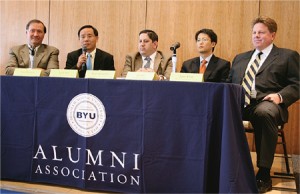Alumni leaders from Asia, South America, and Europe share perspective and receive training.

During a conference for leaders of BYU’s international alumni chapters, some of the participants joined a panel discussion to share they perspectives on international employment issues with students.
Fifteen countries were represented this fall as nearly two dozen international alumni chapter leaders met on campus for a conference. “There are great resources to be gleaned from our international alumni, and the international arena has become a vital area of interest for the BYU Alumni Association,” said Lew W. Cramer (BA ’73), an executive alumni board member who works with international interests.
The two-day program preceded the October general conference of The Church of Jesus Christ of Latter-day Saints and included workshops on chapter leadership strategies, an international reception, and a panel discussion on international employment for students and alumni in the area.
“Our goal was to have these leaders feel the Spirit of the Y and be trained for their roles and responsibilities—and I think they did,” says Keith A. Lue (BS ’86) of Alumni Relations, who coordinates the international chapter program. “Yet international work is a challenge because we are working with diverse cultures where what applies in one geographical area may not be applicable somewhere else.”
Lue indicated the strongest common link among international alumni may be the Church. “Everything is tempered by their faith,” he said. “One of our most successful events was a reception between sessions of general conference.” The reception in the Joseph Smith Memorial Building in Salt Lake City attracted about 250 people.
Several of the international chapter leaders participated in a panel discussion on international employment. The panel discussion underscored some of the challenges that come from working in another country and attracted hundreds of BYU students and alumni to the Hinckley Center’s assembly hall.
Jai W. Lee (JD ’96), a panel participant and senior foreign attorney in Korea, said, “You have to be able to commingle cultures. English is the most important language in the world, and you need both language and cultural understanding to succeed. In addition, the Church is a great resource for those who work globally.”
“A lot of Americans in China speak the local languages, which is significant,” added John W. Shi (MA ’88), the chief representative for the Mallesons Stephen Jacques law firm in Beijing.
“You have to make sure working abroad also works for your family,” said Seth D. Saunders (BA ’99), a senior consultant for Laureate Education in Mexico City. “If your wife is not happy or your children do not adapt well, international work may not be for you.”
“You are there to work,” he added. “You must love what you are doing.” Saunders also suggested the value of the university helping BYU foreign students develop a commitment to returning to their own countries after getting an education. “Why come home? Because we need you. We need educated, young workers. I have to wonder what good it does for Mexico to have one of our students get an education and then work elsewhere.”
Jerald T. Pratt (BS ’82), the executive director of Debt Capital Markets for CIBS World Markets in Canada, suggested that students consider Canada as an opportunity for international work. “Many Canadian companies recognize and respect BYU, which opens a lot of doors for BYU graduates,” he said.
All panelists expressed the need for technical skills in any area of international business. “Technical skills are vital. They cannot be emphasized too much,” said Shi.
Lee summed up the discussion by encouraging students to pursue their international interests. “If you really want to work internationally, find a global company and have them transfer you. Have the desired experience and become bilingual.”









